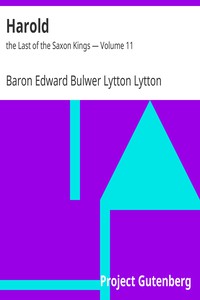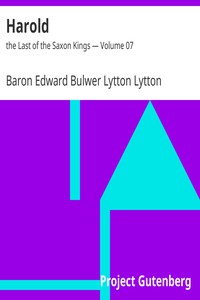Harold : the Last of the Saxon Kings — Complete by Lytton (good books for 8th graders .TXT) 📗

- Author: Lytton
Book online «Harold : the Last of the Saxon Kings — Complete by Lytton (good books for 8th graders .TXT) 📗». Author Lytton
In the evening a messenger from the Roman house arrived, with two letters for Harold; one from Hilda, that contained but these words: “Again peril menaces thee, but in the shape of good. Beware! and, above all, of the evil that wears the form of wisdom.”
The other letter was from Edith; it was long for the letters of that age, and every sentence spoke a heart wrapped in his.
Reading the last, Hilda’s warnings were forgotten. The picture of Edith—the prospect of a power that might at last effect their union, and reward her long devotion—rose before him, to the exclusion of wilder fancies and loftier hopes; and his sleep that night was full of youthful and happy dreams.
The next day the Witan met. The meeting was less stormy than had been expected; for the minds of most men were made up, and so far as Tostig was interested, the facts were too evident and notorious, the witnesses too numerous, to leave any option to the judges. Edward, on whom alone Tostig had relied, had already, with his ordinary vacillation, been swayed towards a right decision, partly by the counsels of Alred and his other prelates, and especially by the representations of Haco, whose grave bearing and profound dissimulation had gained a singular influence over the formal and melancholy King.
By some previous compact or understanding between the opposing parties, there was no attempt, however, to push matters against the offending Tostig to vindictive extremes. There was no suggestion of outlawry, or punishment, beyond the simple deprivation of the earldom he had abused. And in return for this moderation on the one side, the other agreed to support and ratify the new election of the Northumbrians. Morcar was thus formally invested with the vice-kingship of that great realm; while Edwin was confirmed in the earldom of the principal part of Mercia.
On the announcement of these decrees, which were received with loud applause by all the crowd assembled to hear them, Tostig, rallying round him his house-carles, left the town. He went first to Githa, with whom his wife had sought refuge, and, after a long conference with his mother, he, and his haughty Countess, journeyed to the sea-coast, and took ship for Flanders.
CHAPTER IX.
Gurth and Harold were seated in close commune in the Earl’s chamber, at an hour long after the complin (or second vespers), when Alred entered unexpectedly. The old man’s face was unusually grave, and Harold’s penetrating eye saw that he was gloomy with some matters of great moment.
“Harold,” said the prelate, seating himself, “the hour has come to test thy truth, when thou saidst that thou wert ready to make all sacrifice to thy land, and further, that thou wouldst abide by the counsel of those free from thy passions, and looking on thee only as the instrument of England’s weal.”
“Speak on, father,” said Harold, turning somewhat pale at the solemnity of the address; “I am ready, if the council so desire, to remain a subject, and aid in the choice of a worthier king.”
“Thou divinest me ill,” answered Alred; “I do not call on thee to lay aside the crown, but to crucify the heart. The decree of the Witan assigns Mercia and Northumbria to the sons of Algar. The old demarcations of the heptarchy, as thou knowest, are scarce worn out; it is even now less one monarchy, than various states retaining their own laws, and inhabitated by different races, who under the sub-kings, called earls, acknowledge a supreme head in the Basileus of Britain. Mercia hath its March law and its prince; Northumbria its Dane law and its leader. To elect a king without civil war, these realms, for so they are, must unite with and sanction the Witans elsewhere held. Only thus can the kingdom be firm against foes without and anarchy within; and the more so, from the alliance between the new earls of those great provinces and the House of Gryffyth, which still lives in Caradoc his son. What if at Edward’s death Mercia and Northumbria refuse to sanction thy accession? What if, when all our force were needed against the Norman, the Welch broke loose from their hills, and the Scots from their moors! Malcolm of Cumbria, now King of Scotland, is Tostig’s dearest friend, while his people side with Morcar. Verily these are dangers enow for a new king, even if William’s sword slept in its sheath.”
“Thou speakest the words of wisdom,” said Harold, “but I knew beforehand that he who wears a crown must abjure repose.”
“Not so; there is one way, and but one, to reconcile all England to thy dominion—to win to thee not the cold neutrality but the eager zeal of Mercia and Northumbria; to make the first guard thee from the Welch, the last be thy rampart against the Scot. In a word, thou must ally thyself with the blood of these young earls; thou must wed with Aldyth their sister.”
The Earl sprang to his feet aghast.
“No—no!” he exclaimed; “not that!—any sacrifice but that!—rather forfeit the throne than resign the heart that leans on mine! Thou knowest my pledge to Edith, my cousin; pledge hallowed by the faith of long years. No—no, have mercy—human mercy; I can wed no other!—any sacrifice but that!”
The good prelate, though not unprepared for this burst, was much moved by its genuine anguish; but, steadfast to his purpose, he resumed:
“Alas, my son, so say we all in the hour of trial—any sacrifice but that which duty and Heaven ordain. Resign the throne thou canst not, or thou leavest the land without a ruler, distracted by rival claims and ambitions, an easy prey to the Norman. Resign thy human affections thou canst and must; and the more, O Harold, that even if duty compelled not this new alliance, the old tie is one of sin, which, as king, and as high example in high place to all men, thy conscience within, and the Church without, summon thee to break. How purify the erring lives of the churchman, if thyself a rebel to the Church? and if thou hast thought that thy power as king might prevail on the Roman Pontiff to grant dispensation for wedlock within the degrees, and that so thou mightest legally confirm thy now illegal troth; bethink thee well, thou hast a more dread and urgent boon now to ask—in absolution from thine oath to William. Both prayers, surely, our Roman father will not grant. Wilt thou choose that which absolves from sin, or that which consults but thy carnal affections?”
Harold covered his face with his hands, and groaned aloud in his strong agony.
“Aid me, Gurth,” cried Alred, “thou, sinless and spotless; thou, in whose voice a brother’s love can blend with a Christian’s zeal; aid me, Gurth, to melt the stubborn, but to comfort the human, heart.”
Then Gurth, with a strong effort over himself, knelt by Harold’s side, and in strong simple language, backed the representations of the priest. In truth, all argument drawn from reason, whether in the state of the land, or the new duties to which Harold was committed, were on the one side, and unanswerable; on the other, was but that mighty resistance which love opposes ever to reason. And Harold continued to





Comments (0)